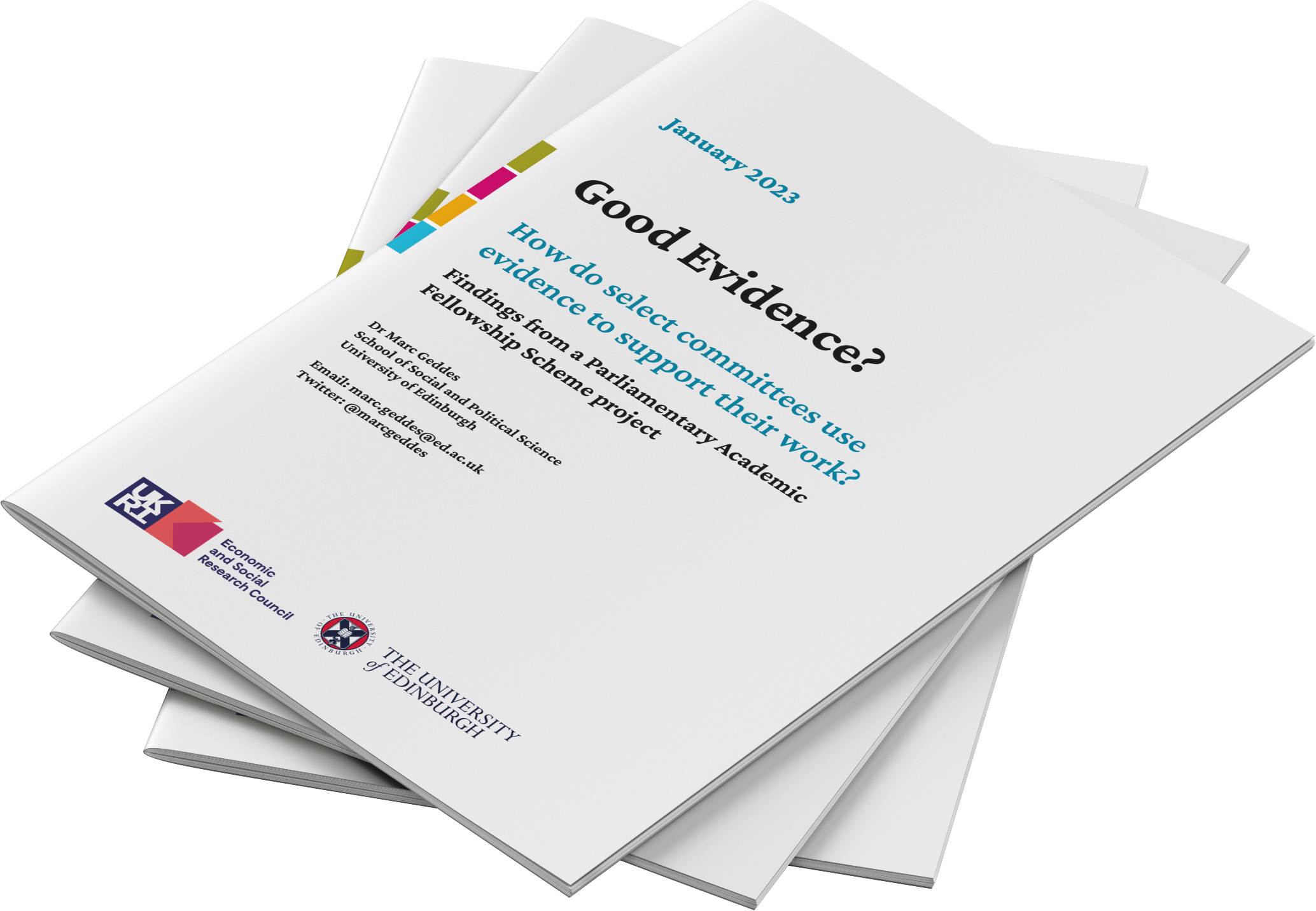Good Evidence? Findings from a Parliamentary Academic Fellowship
Principal investigator
Principal investigator
Research team
Research team
Overview
Description
About the project
In this project, Marc Geddes examines the role and use of evidence by MPs and officials in supporting select committees, based on a 12-month fellowship with the UK Parliament between August 2021 and July 2022. This project examined how evidence is gathered and used; implications for understanding ‘good’ evidence; and challenges for evidence use. The project was organised through the Parliamentary Office for Science and Technology’s Parliamentary Academic Fellowship Scheme, and funded by an ESRC Impact Acceleration Account grant by the University of Edinburgh.
On this page, you can find a full copy of the report, outputs based on this project, a summary of the key findings, and contact information about the author.

Download full report - PDF (520k)
Key findings
The main report, split into several sections, is a starting point and initial summary of the main findings from this project (which will be analysed further for academic outputs). The main findings of the project are summarised in the Executive Summary (pp.3-4). They include the following:
- Regarding how evidence is gathered and used, Good Evidence? identifies a growing role of lived experience, an emphasis on diversity of political views and witnesses’ representativeness, and a changing role of select committees not only to provide government scrutiny but to act as vehicles for public participation and policy learning;
- Regarding challenges for evidence use, Good Evidence? identifies a growth in the volumes of evidence, clarity regarding the purpose of ‘lived experience’ and promoting diversity, a tension around the changing function of select committees, and pressures on resources and staff as a result of growing committee work.
- Regarding implications for principles of ‘good’ evidence use, the report suggests that evidence needs to be appropriate for the inquiry, that the evidence base should be diverse, that evidence needs resources for systematic analysis, and that evidence needs to be engaging so as to be led by MPs.
The report closes with a suggestion to re-frame evidence-gathering in terms of three evidence pillars to ensure the process of gathering evidence matches current practice: Pillar 1 includes submissions of information; Pillar 2 includes committee hearings; and Pillar 3 includes consultation and engagement exercises.
Outputs
Further outputs from this project will be listed here.
About the author
Dr Marc Geddes is Senior Lecturer in Politics at the School of Social and Political Science, University of Edinburgh. His research focuses on how MPs and officials interpret and undertake their roles in parliaments. He has published widely on the role of select committees in the UK House of Commons, including an award-winning book, Dramas at Westminster (Manchester University Press, 2020), and in a range of specialist journals and for public audiences.
Acknowledgements
This project took place thanks to the goodwill and free time of MPs and officials. In no particular order, the authors thanks: the Environmental Audit Committee and the committee team for hosting this fellowship and teaching the author about evidence-gathering; the Parliamentary Office for Science and Technology, especially the KE Unit, for organising and supporting the fellowship; the Economic and Social Research Council for part-funding this fellowship; the University of Edinburgh for giving the author the time to do this research; and – most important – the interviewees for participating. Due to the promise of anonymity, they are not named here, but it is due to their patience and their willingness to reflect on ‘evidence’ for extended periods of time that this project was made possible. Any errors that remain are those of the author, who bears full responsibility for the conclusions raised in this report.
Research themes
- UK and Comparative Politics
- Elections, public opinion and parties
- Governance & Democracy